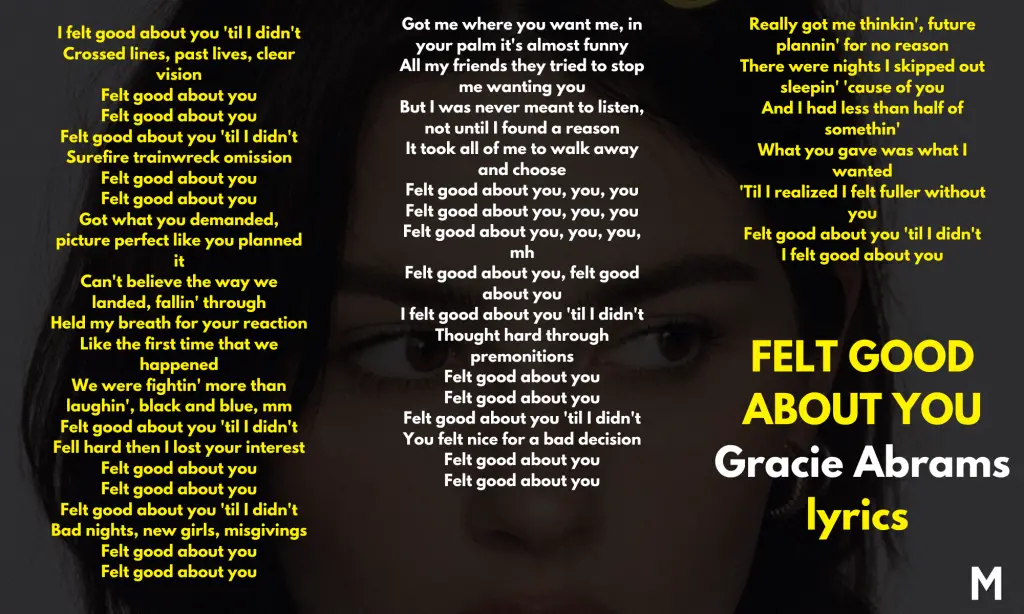Table of Contents
Image C/O Gracie Abrams & Interscope Records
As someone with a background in English literature and creative writing, I love using songs like Gracie Abrams’ “Risk” as a chance to dig deeper into their poetic meaning. In this breakdown, I’ll use some of my favorite insights from literary history to shed new light on the lyrics. These are just my own takes, but by looking at the song through the lens of classic poetry, I hope we can reveal the song’s deeper, timeless themes. Gracie’s music invites us to examine feelings of longing, fantasy, and emotional risk—feelings that poets have explored for centuries.
I see “Risk” as a perfect excuse to stretch those literary comparisons and see how classic poetry, from Keats to Plath, relates to the emotions in Abrams’ lyrics. Whether you’re a longtime poetry fan or new to it, I think classic literature can give us a more nuanced understanding of why songs like “Risk” resonate so much today. With each line, we’ll uncover how Abrams captures that universal urge to dive headfirst into uncertain emotions and how she makes the thrill and vulnerability of romantic risk feel as powerful as ever.
See Gracie Abrams Live On Tour Here👈
Snag Gracie Abrams On Vinyl Here👈
https://youtube.com/watch?v=6c22lP9nBxM&si=HO-jkEKN_sYTGMBw
Risk Gracie Abrams Lyrics
Risk Gracie Abrams Meaning
“Look at me now / Said I wouldn’t do it, but I hunted you down”
In these opening lines, Abrams’ speaker acknowledges a mix of curiosity and guilt in pursuing someone she told herself she’d avoid. Her use of the word “hunted” is deliberate, implying she actively sought this person out, even though it might bring emotional complications. There’s a tug-of-war here: part of her knows she’s going after something risky, while another part of her feels drawn to the potential closeness. This internal conflict signals that even at the very start, the speaker is navigating the tension between desire and caution, which sets the tone for the rest of the song.
The speaker’s confession reminds us of John Keats’ “La Belle Dame sans Merci,” where a knight becomes enchanted by a mysterious woman, only to find himself alone and longing. Keats writes, “O what can ail thee, knight-at-arms, / Alone and palely loitering,” showing how deeply the knight is affected by the emotional pull of someone who is only partly accessible to him. Like Abrams’ speaker, Keats’ knight is enticed by fantasy, a person who becomes larger in his mind than in reality. Both characters chase after people who may not be capable of fulfilling their hopes, drawn by an attraction that may not have a foundation.
This connection to Keats’ work highlights a timeless human urge to pursue even uncertain desires. Both Abrams’ speaker and the knight feel caught between attraction and the haunting possibility of loneliness. The fact that Abrams’ speaker goes after someone despite her initial hesitation shows the courage and vulnerability that love demands. We see her conflicted emotions set the stage for a journey that will waver between hope and despair, just as the knight’s encounter with the mysterious woman leaves him questioning whether love can satisfy or only wound.
“God, I’m actually invested / Haven’t even met him / Watch this be the wrong thing”
The chorus reflects the speaker’s awareness of her own emotional investment in someone she doesn’t truly know. She admits, with a bit of self-deprecating humor, that this might be “the wrong thing,” implying that she recognizes the risks. Her line, “haven’t even met him,” underscores that her feelings are based more on fantasy than reality. Yet, she acknowledges her own vulnerability, which shows both her self-awareness and her openness to the thrill and risk of diving into new emotions.
This situation parallels Sylvia Plath’s “Mad Girl’s Love Song,” where Plath’s speaker confesses, “I think I made you up inside my head.” In Plath’s poem, there’s a deep sense of longing mixed with a sense that the love may not be real at all. Both Plath and Abrams’ speakers feel ironic about their feelings—knowing that their investment is based more on dreams than truth. Plath’s line reflects the torment of desiring someone who may only exist in her mind, and this connects closely to Abrams’ theme of infatuation with someone she barely knows.
Both Plath and Abrams explore how imagination can amplify longing, making their emotional investments feel intense but precarious. By admitting she’s “actually invested,” Abrams’ speaker is humorous and resigned, signaling that she knows where this story might lead but can’t pull away. The comparison to Plath’s work shows how powerful—and sometimes painful—feelings can be when they are rooted in fantasy. This section is where Abrams dives into the thrill of attachment, even as she senses the likely heartbreak that will follow.
“God, I’m jumping in the deep end / It’s more fun to swim in / Heard the risk is drownin’, but I’m gonna take it”
Here, the speaker embraces the thrill of taking a risk, even if she knows it might lead to heartbreak. By describing herself as “jumping in the deep end,” she’s saying that while this journey might be unpredictable, she finds excitement in the uncertainty. She’s aware of the chance of “drowning,” a metaphor for emotional pain, but she’s choosing to dive in anyway. This signals her willingness to embrace the highs and lows of love, despite knowing that she may come out hurt in the end.
This acceptance of risk and vulnerability echoes themes found in W.B. Yeats’ “When You Are Old.” Yeats reflects on a love that might be missed, saying, “And bending down beside the glowing bars, / Murmur, a little sadly, how Love fled.” In this line, Yeats’ speaker regrets lost love, and there’s a wistfulness for something that could have been. Both Yeats and Abrams’ lyrics illustrate a universal truth about love: even when we know the risks, we often jump in because we crave the intensity of connection, regardless of the outcome.
For both Abrams and Yeats, risking heartbreak is a part of the allure of love. Abrams’ speaker knows that taking the plunge into these feelings might hurt, yet there’s a pull to experience the depth of love. By acknowledging the risk of “drowning,” she’s fully aware of her vulnerability, but she’s willing to embrace it. Both poets share a similar understanding—that love’s rewards come with risks, and sometimes those risks are worth taking, even if they end in loss.
“In my head / You’re in the car and / You’re coming to me and / You get to my door and / You can’t even speak but / I think that it’s sweet”
This section reveals the speaker’s vivid imagination as she envisions a whole scenario of the person coming to her, shy but kind. It’s an idealized image of connection, showing how deeply her feelings run even though they’re largely imaginary. This scene is entirely in her head, yet it feels real to her, highlighting the power of her emotional investment and the strength of her longing.
Sylvia Plath’s “Mad Girl’s Love Song” similarly delves into this theme of imagined connection. Plath’s speaker says, “I shut my eyes and all the world drops dead; / I think I made you up inside my head.” Like Abrams’ speaker, Plath’s speaker creates a whole world where the other person feels close, even if that closeness is just a fantasy. Both speakers show how imagination can heighten desire, making the object of affection feel closer than they truly are. This imagined scenario’s “sweet” nature reflects her desire for tenderness, even if it’s based more on dreams than reality.
Abrams’ lyrics show how easy it can be to build up an emotional bond with someone who may not even share those feelings. In her mind, she’s already sharing moments with this person, finding sweetness in what isn’t actually happening. Plath and Abrams both capture how longing can become so powerful that it builds entire scenes in the imagination. By doing this, they reveal a bittersweet reality: sometimes, fantasy is enough to keep hope alive, even if it’s not grounded in real experiences.
“I’m gonna bend ‘til I break and / You’ll be my favorite mistake”
In this line, the speaker acknowledges that she might end up heartbroken but seems willing to accept it. Calling the person her “favorite mistake” shows her recognition that even if it’s not right, it’s still worth experiencing. She’s willing to risk pain to feel something real, embracing both the joy and sorrow that come with emotional vulnerability. There’s a sense of strength here, as she chooses to fully commit, even if it leads to regret.
This sentiment connects well with Yeats’ “When You Are Old,” where the speaker reflects on a love that was never fully realized. Yeats writes, “But one man loved the pilgrim soul in you, / And loved the sorrows of your changing face.” Yeats’ speaker acknowledges the beauty in love, even if it’s tinged with sorrow and loss. Abrams’ speaker, in calling this connection a “favorite mistake,” is willing to face similar bittersweet emotions. She knows the risks but sees value in the connection, even if it brings sadness.
Both Yeats and Abrams express the idea that love, despite its flaws, is a journey worth taking. Abrams’ willingness to “bend ‘til I break” and still see value in the experience reveals a mature understanding of love’s highs and lows. By choosing to embrace this “mistake,” she mirrors Yeats’ wisdom about love: it’s often worth the journey, even if the end isn’t perfect. Through this, Abrams underscores the timeless truth that love remains one of life’s most worthwhile pursuits even with its potential for pain.
Themes, Meanings, and Main Takeaways
At its heart, “Risk” by Gracie Abrams tackles the thrill of attraction, the vulnerability of emotional investment, and the struggle between fantasy and reality. These themes have been central to love poetry for ages, but Abrams brings them to a fresh, modern context by exploring them through the raw and direct language of a crush that has taken over her thoughts.
With lyrics like “God, I’m actually invested / Haven’t even met him,” Abrams captures the pull of attraction that lives more in her imagination than in real life. This type of longing is universal, as shown in poems like Sylvia Plath’s “Mad Girl’s Love Song,” where Plath’s speaker also gets tangled in imagined intimacy. Abrams, like Plath, is dealing with feelings that might be more about her inner world than any true connection.
In this song, Abrams also touches on the idea of emotional risk and the price of diving into uncharted feelings, just as we see in John Keats’ “La Belle Dame sans Merci.” The knight in Keats’ poem is drawn to a captivating figure who ultimately vanishes, leaving him in a lonely reverie. Much like Abrams’ speaker, Keats’ knight knowingly pursues an uncertain love, one that feels intense and consuming but may lack a solid foundation. When Abrams sings, “It’s more fun to swim in / Heard the risk is drownin’, but I’m gonna take it,” she’s acknowledging that emotional risks carry weight—but that the possibility of connection is worth it.
This line echoes the timeless understanding that love and heartbreak are intertwined, something Keats emphasizes by showing the knight in the wake of an impossible connection.
Finally, both Abrams and W.B. Yeats in “When You Are Old” explore the notion of regret and longing for love that may never fully materialize. Yeats’ speaker reflects on a love that could have been, saying, “how Love fled,” and describing a kind of meaningful affection that remains out of reach. Similarly, Abrams’ song explores the fine line between real and imagined connections, as the speaker recognizes that her investment might end in disappointment, yet she pursues it anyway. This theme—loving despite potential regret—captures the timeless allure of risky love.
Through these connections, “Risk” reflects the same truths that these poets have addressed for centuries: love is often beautiful, painful, and worth pursuing, even if the outcome remains uncertain. Abrams’ lyrics bring these themes into a modern, accessible context that resonates deeply with listeners today.
The post Risk Gracie Abrams Lyrics and Meaning: The Romance of Risk in Poetry and Pop Lyrics appeared first on Magnetic Magazine.






